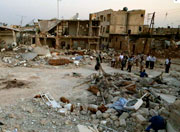
Due to its geostrategic importance, there is a convergence of conflicting interests over Syria that has prevented world powers from reaching a consensus on how to stop a crisis that, in less than two years, has claimed the lives of some sixty thousand people. In addition to these rivalries, the complexity of the country’s makeup—its geography as well as its population density and heterogeneity—have precluded the possibility of agreeing on a solution such as a Libya-style military intervention.
The fate of Syria is in the hands of the rebels and the regime of Bashar al-Assad, though the former is increasingly being taken over by Islamist groups with ties to al-Qaeda-type organizations. Reports coming from Syria recently have focused on what their rising prominence means for the future of the conflict and, in the longer term, for the country as a whole. Their ultimate influence over Syria, however, should not be overestimated, since at the end of the day they represent the ideas of only a small fraction of the population.
Key Conclusions
- Islamist al-Qaeda-type groups are gaining prominence and credibility in Syria.
- Their rise in popularity is partly a reaction to the excesses of the more mainstream militant groups.
- Some of the steps taken by the international community have been counterproductive and also contributed to the success of these groups.
- The voice of original protesters in the Syrian uprising calling for a free, fair, and democratic state have been marginalized.
- Extremists groups represent a fraction of the Syrian population, therefore their impact in the future of the country should not be overstated.
Analysis
Indirect attempts to intervene in the conflict have mostly been a series of failures, whether the attempts were to strengthen the Syrian opposition in the diaspora; provide them with weapons; or, most recently, in a desperate effort to stymie their rise, include Islamists in a US list of terrorist organizations. Perhaps the only exception has been the distribution of humanitarian aid, which, although insufficient, is undeniably a positive contribution, with the refugee camps in neighboring countries being the most palpable example.
The failure of the opposition groups within the diaspora stems from their lack of influence inside the country. The struggle among the opponents to the regime over influence in the direction of the country is about legitimacy and credibility, and although the opposition may have legitimate claims to represent Syria, they lack the credibility. By virtue of being outside the country, they are out of touch with the situation on the ground and do not share in the tremendous daily suffering of those in the country—on the contrary, they hold court in luxurious hotels—and are seen as being riddled with petty rivalries.
The conflict is thus in the hands of Syrians inside the country, where the forecast there is unfortunately also bleak. The voices of those who led the demonstrations against the regime in its early days and who represent a new, democratic, and pluralistic Syria are no longer being heard. The Free Syrian Army—which pretends to be a multidenominational outfit, despite being mostly composed of Sunnis—is losing credibility by the day, to the point that some analysts consider it the main reason the regime is keeping together. Its members are seen as increasingly taking advantage of the power that their weapons grant them in order to enrich themselves, or simply acting recklessly. Another major problem is their lack of military discipline, leading to the execution of prisoners—a recurrent problem that is very damaging to their moral high ground and reduces them to the level of brutality of the regime. These are tendencies that make the population doubt whether they would be in better hands if the regime were to collapse, and even fear a rebels’ victory.
On the other hand, Islamist groups are seen as more disciplined and are thus gaining credibility; they have also accrued popularity with their military successes, a result of their experience in other conflicts, most saliently in Iraq. Furthermore, in a country like Syria, and in the Middle East region where the colonial legacy weighs so heavily that it is central to the daily political discourse, the decision of the US administration to start including rebels in its terrorist list is having the opposite effect, bolstering the credibility of these units.
There is a parallel in this respect between Syria and Libya, where Islamist groups played an important role and are still a force to be reckoned with. In the case of Libya, the NATO-led military intervention may partly explain the overall marginalization of these organizations in the post-Qaddafi phase, in that support was provided to more mainstream armed groups. However, one may also argue that they were never destined to assume a leadership role because they simply lack a broad enough constituency.
From a broad historical perspective, the influence of radical Islamist groups may be a passing phase—albeit one that could prolong itself for as long as fighting continues and could complicate a transition to democracy. However, the overwhelming sense among those Syrians who saw in the uprising a genuine opportunity to build a free, fair, and democratic state is one of disappointment with the international community standing passively or only willing to guard their own interests in the face of daily massacres.
Jose Vericat is an Advisor at the International Peace Institute.
About the photo: A residential area in Azaz, hit by at least two bombs from a Syrian fighter jet on August 15, 2012. © Rachel Beth Anderson for Human Rights Watch




